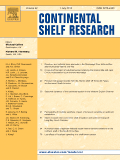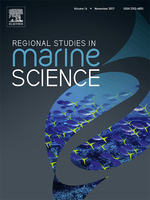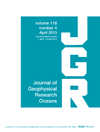
CONTINENTAL SHELF RESEARCH
Scope & Guideline
Connecting Geology and Aquatic Science for a Sustainable Future
Introduction
Aims and Scopes
- Sediment Dynamics and Transport:
Research focuses on the processes of sediment transport and deposition across continental shelves, including the effects of hydrodynamic conditions, storm events, and human activities on sedimentary environments. - Marine Ecosystem Dynamics:
Investigations into the structure and function of marine ecosystems, particularly how environmental factors influence biodiversity, community composition, and ecological interactions within shelf waters. - Biogeochemical Cycles:
Studies examining the cycling of nutrients and organic matter in coastal and shelf regions, with a focus on how these processes are affected by both natural variability and anthropogenic influences. - Hydrodynamics and Circulation Patterns:
Research into the physical processes that govern the movement of water in coastal zones, including tidal dynamics, upwelling, and the impacts of climate change on ocean currents. - Impact of Climate Change and Human Activity:
Assessments of how climate change and human activities, such as coastal development and pollution, affect marine environments, including the responses of ecosystems and sedimentary processes.
Trending and Emerging
- Climate Change Impacts:
An increasing number of studies are dedicated to understanding the impacts of climate change on marine environments, including shifts in species distribution, changes in sediment dynamics, and the responses of ecosystems to temperature and sea-level rise. - Microbial and Phytoplankton Dynamics:
Research on the roles of microbial communities and phytoplankton in coastal ecosystems is gaining traction, focusing on their contributions to biogeochemical cycles and their responses to environmental changes. - Anthropogenic Influences and Pollution:
There is a notable increase in studies addressing the effects of pollution, including microplastics and chemical contaminants, on marine life and sediment quality, reflecting growing concerns about human impacts on marine environments. - Integrated Coastal Management:
Emerging research emphasizes the importance of integrated approaches to coastal management, incorporating ecological, social, and economic perspectives to promote sustainability in coastal and marine resource use. - Remote Sensing and Modeling Approaches:
The use of advanced remote sensing technologies and numerical modeling to study dynamic processes in coastal waters is on the rise, providing new insights into hydrodynamics, sediment transport, and ecosystem changes.
Declining or Waning
- Traditional Methods of Sediment Analysis:
There appears to be a waning interest in conventional sediment analysis methods, such as basic grain size analysis, as more advanced techniques and modeling approaches gain popularity. - Species-Specific Studies:
Research that focuses solely on individual species without considering broader ecological contexts is declining, as there is a shift towards more holistic approaches that examine community dynamics and ecosystem interactions. - Static Habitat Assessments:
There is a decreasing emphasis on static assessments of benthic habitats, as more dynamic and temporal studies are prioritized to understand changes in response to environmental shifts.
Similar Journals

GEO-MARINE LETTERS
Advancing Knowledge in Marine and Geological ResearchGEO-MARINE LETTERS, published by Springer, is a prestigious academic journal that has been a pivotal platform for the dissemination of innovative research in the fields of Earth and Planetary Sciences, Oceanography, Environmental Science, and Geotechnical Engineering since its inception in 1981. With an E-ISSN of 1432-1157, this journal has established itself in the Q2 quartile across multiple categories in 2023, indicating its influential position within the scientific community, as reflected by its Scopus rankings. While it currently does not offer an open access option, its rigorous peer-review process ensures the publication of high-quality research that contributes significantly to advancing our understanding of marine and geological sciences. Researchers, professionals, and students alike will benefit from the diverse scope of studies featured in GEO-MARINE LETTERS, making it an essential resource for those engaged in environmental and marine research. Situated in Germany, the journal's commitment to excellence continues to shape critical discussions and innovations in the field.

Regional Studies in Marine Science
Advancing Knowledge for Sustainable SeasRegional Studies in Marine Science, published by Elsevier, is a leading academic journal dedicated to advancing the understanding of marine ecosystems and their regional dynamics since its inception in 2015. With an ISSN of 2352-4855, this journal is indexed in Scopus and has achieved impressive ranking quartiles, notably Q2 in categories like Animal Science and Zoology, and Ecology, showcasing its relevance and impact in these fields. As of 2023, it ranks in the 79th percentile for Animal Science and Zoology, reflecting its significant contribution to academic discourse. While the journal operates under a traditional access model, its rigorous peer-review process ensures the publication of high-quality research that is crucial for understanding ecological interactions and fostering sustainable practices within marine environments. Researchers, professionals, and students alike will find this journal an invaluable resource for the latest findings and advancements in marine science, as it strives to bridge the gap between research and practical application at regional and global levels.

Ocean and Coastal Research
Navigating the challenges of marine resource management.Ocean and Coastal Research, published by the Institute Oceanográfico of the University of São Paulo, is an essential academic journal dedicated to advancing the fields of Aquatic Science, Oceanography, and Water Science and Technology. Established in 2020, the journal has quickly become a noteworthy platform contributing to the understanding and sustainable management of marine and coastal ecosystems, with an open access model that promotes the dissemination of critical research findings. Although currently categorized in the fourth quartile across its respective fields in 2023, the journal serves as an emerging repository of valuable insights for researchers, professionals, and students alike, aiming to make impactful discoveries that address contemporary challenges in ocean conservation and resource management. The journal's editorial team is committed to fostering interdisciplinary collaboration and upholding rigorous peer-review standards, thereby ensuring high-quality contributions that reflect the dynamic nature of marine science. With an E-ISSN of 2675-2824, all access to published articles is freely available, supporting global research efforts addressing crucial environmental issues.

JOURNAL OF WATERWAY PORT COASTAL AND OCEAN ENGINEERING
Exploring the Depths of Coastal and Ocean EngineeringThe JOURNAL OF WATERWAY PORT COASTAL AND OCEAN ENGINEERING, published by the ASCE - American Society of Civil Engineers, is a premier scholarly journal devoted to the interdisciplinary fields of waterway, port, coastal, and ocean engineering. Since its inception in 1982, the journal has provided a crucial platform for researchers, professionals, and students to share innovative findings and advancements related to the engineering and management of aquatic environments. With an impressive Q2 ranking in multiple categories, including Civil and Structural Engineering, Ocean Engineering, and Water Science and Technology, the journal is recognized for its significant contributions to the field. It seeks to publish high-quality research that addresses both theoretical and practical challenges while promoting sustainable practices in marine and coastal systems. Holding a prominent Scopus rank and providing access to a global readership, the journal stands as an invaluable resource for those dedicated to advancing the science and engineering of water environments.

International Journal of Marine and Coastal Law
Charting New Territories in Marine and Coastal LawThe International Journal of Marine and Coastal Law, published by Martinus Nijhoff Publishers, is a leading academic periodical dedicated to the exploration of legal aspects related to marine and coastal environments. With a strong emphasis on interdisciplinary research, this journal serves as a vital resource for scholars, practitioners, and policymakers engaged in areas such as environmental science, oceanography, and law. Since its inception in 1986, the journal has continuously evolved to address contemporary challenges in the field, boasting a commendable Q2 ranking in Law and Q3 rankings across various relevant categories. The journal facilitates rigorous discourse on pressing issues, providing a platform for high-quality research that aims to inform legal frameworks and enhance sustainable practices. Although it does not offer open access, the journal’s impact extends to its notable Scopus rankings and its essential role in shaping legal discourse on marine and coastal management. Researchers and professionals will find invaluable insights and scholarly contributions that are crucial for advancing knowledge and policy in this critical area of study.

JOURNAL OF GEOPHYSICAL RESEARCH-OCEANS
Innovating Insights into Oceanic PhenomenaJournal of Geophysical Research-Oceans is a premier interdisciplinary journal published by the American Geophysical Union, focused on the dynamic field of ocean sciences. With a rich history dating back to 1986, this journal has become a pivotal platform for researchers, providing a wealth of data and innovative insights into oceanographic processes and their essential role within the Earth's system. The journal enjoys an impressive impact factor and consistently ranks in the Q1 quartile across numerous categories, including Earth and Planetary Sciences and Oceanography, making it a respected source for cutting-edge research and reviews. Notably, it holds significant positions within Scopus rankings, further emphasizing its importance in shaping the scientific discourse surrounding oceanic phenomena. While available through subscription, the Journal of Geophysical Research-Oceans remains an invaluable resource for academics, industry professionals, and students eager to deepen their understanding of ocean dynamics and geophysical interactions.

Jurnal Ilmu dan Teknologi Kelautan Tropis
Empowering science to safeguard marine biodiversity.Jurnal Ilmu dan Teknologi Kelautan Tropis (ISSN: 2087-9423, E-ISSN: 2085-6695) is a premier scientific journal published by the Indonesian Oceanologists Association in collaboration with the Bogor Agricultural University, specifically from the Department of Marine Science and Technology. This journal is committed to advancing the field of tropical marine science, publishing high-quality research that addresses pressing issues in oceanography, marine ecosystems, and sustainable practices in tropical regions. By facilitating open access to valuable scientific knowledge, Jurnal Ilmu dan Teknologi Kelautan Tropis aims to engage researchers, professionals, and students alike, fostering collaboration and innovation in marine research. Located in the picturesque region of Bogor, West Java, Indonesia, this journal serves as a vital platform for disseminating findings that contribute to the conservation and effective management of tropical marine resources.

Ocean Science Journal
Advancing Marine Science for a Sustainable FutureOcean Science Journal, published by the Korea Institute of Ocean Science and Technology (KIOST), is a pivotal resource for scholars and practitioners in the field of oceanography. With the ISSN 1738-5261 and E-ISSN 2005-7172, this journal presents cutting-edge research from 2006 to 2024, bridging fundamental and applied ocean sciences. Based in South Korea, with its headquarters located in Busan, the journal has achieved a commendable Scopus rank of #72 out of 145 in the domain of Earth and Planetary Sciences, placing it in the 50th percentile among peer publications. Classified in the Q3 category of the 2023 Oceanography rankings, Ocean Science Journal offers a platform for innovative studies that advance understanding of marine environments and promote sustainable ocean practices. While it does not operate under an open access model, readers and contributors can expect high-quality, peer-reviewed material that addresses pressing oceanic challenges and developments. This journal serves as an essential tool for researchers, professionals, and students committed to fostering marine science and ocean technology.

Indian Journal of Geo-Marine Sciences
Fostering Collaboration in Geo-Marine SciencesThe Indian Journal of Geo-Marine Sciences, published by the NATIONAL INSTITUTE OF SCIENCE COMMUNICATION & INFORMATICS (NISCAIR), serves as a vital platform dedicated to the dissemination and advancement of knowledge in the field of marine and geosciences. As an open-access journal, it allows for improved visibility and accessibility of research findings to a global audience, enabling researchers, professionals, and students to share insights into oceanography and related disciplines. With a publication history spanning from 2007 to 2010 and continuing from 2012 to 2024, it has established itself within the academic community as a reliable source of innovative research, despite being classified in Q4 of Oceanography and holding a Scopus rank that places it in the 27th percentile. This journal is particularly relevant for those investigating marine ecosystems, geological oceanography, and their interconnections, thus playing an essential role in fostering understanding and communication within this important area of scientific inquiry.

Research in Marine Sciences
Bridging theory and practice in marine studies.Research in Marine Sciences, ISSN 2538-5542, is a leading journal published by ARMAN DARYA INC, specializing in the dynamic and interdisciplinary field of marine science. With a commitment to advancing knowledge in areas such as marine ecology, oceanography, and marine conservation, this journal provides a collaborative platform for researchers, professionals, and students to disseminate their findings. Although it operates under a traditional subscription model, the journal ensures that the latest research is accessible to a wide audience, promoting the understanding of marine environments crucial for biodiversity and sustainability. The journal aims to bridge the gap between theoretical research and practical applications, emphasizing the need for rigorous studies that address pressing marine issues in a rapidly changing world. By contributing to the body of literature in marine sciences, Research in Marine Sciences plays a vital role in shaping the future of marine research and policy-making.